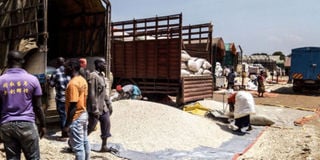Prime
Kenya to import Uganda’s maize

Maize dealers offload maize that was meant for export to Kenya at Busia market after Kenya imposed a ban on importation of maize from Uganda on March 9, 2021. PHOTO | DAVID AWORI
What you need to know:
- The move comes months after the William Ruto-led government announced an import window amid drought.
Nairobi is targeting to import a huge consignment of maize from Uganda to cushion her domestic grain deficit.
The deficit is being attributed to low production in the growing areas of Kitale and Rift Valley regions due to bad weather.
Mr Kingoli Mathenge, the chairman of Kenya cereals cross border trade, last Thursday said: “We intend to import two million tonnes because our harvests in the growing areas were too low to sustain the local market demands.”
He said they intended to import huge consignments of maize mainly from Uganda, but should Ugandan supply be insufficient, then they will look elsewhere.
Last December, Kenya’s Agriculture Cabinet Secretary Mithika Linturi told Parliament that the country would import 900,000 tonnes of duty-free white maize between February and August 2023 amid drought and surging prices of the staple.
He said Kenya imports nearly six million bags of maize every year from mainly Uganda and Tanzania.
In Kenya, maize is milled for flour (posho) and porridge, making local beverages (kwete), or can be prepared wholly and mixed with beans, which is a popular delicacy known as “Nyoyo” among the Luo community, “Githeri” among the Kikuyu, and Mayengere in the Luya communities.
Mr Samuel Wamakuyu, a grain trader at Busia market and secretary of Busia multiple purpose produce dealers, at the weekend confirmed that Kenya wants to import more than over two million tonnes of maize from Uganda.
He said:“Whereas Uganda had such maize for export following good harvests in Northern Uganda, Mubende, Hoima, Kayunga and parts of Busoga, the country may be overwhelmed by the demand because South Sudan, Democratic Republic of Congo, Tanzania, Rwanda and Somalia are all targeting to import our maize.”
Mr Wamakuyu wondered whether the current stocks can sustain the external and internal markets, especially the increasing demand from schools and millers in Uganda.
A trader and grain trade data analyst at Busia border, Mr Henry Bwire, said maize prices have shot up over the past two weeks from Shs1,200 to Shs1,600 per kilogramme due to high demand.
“The demand for maize across the border to Kenya was high such that each day, about 1,500 tonnes were informally being shipped out through porous borders, while over 2,000 tonnes cross the border formally to the neighbouring country every day.
Mr Godfrey Oundo Ongwabe, the national chairperson cross border trade, said amidst such high demand, traders and farmers should ensure they stick to the production of quality grain for the region and other markets.
He urged farmers to improve the post-harvest handling of maize to ensure it meets the standards within the country and the regional markets.
“Uganda is a member of the World Trade Organisation (WTO) and has obligations of ensuring that they produce quality goods, not only for their internal consumption, but also for global markets and that is why issues of quality are very key,” Mr Oundo said.
Mr Bwire, however, thinks this particular season, farmers are bringing a better quality of maize compared to previous seasons.
He said: “We are seeing very clean seeds for the first time coming from all regions, including Busoga, which has been a source of dirty maize.”
Farmers and traders have welcomed the news because prices of maize could increase much higher.
But domestic consumers will have to pay more for a kilogramme of maize.




